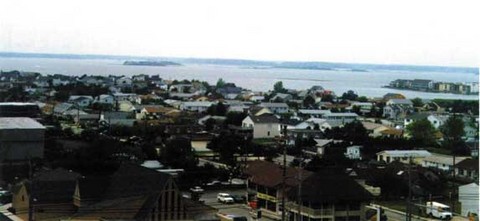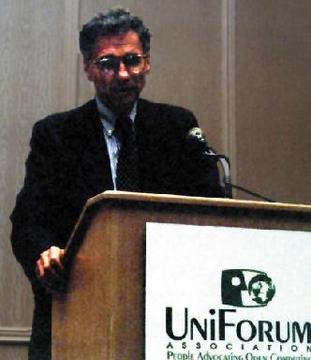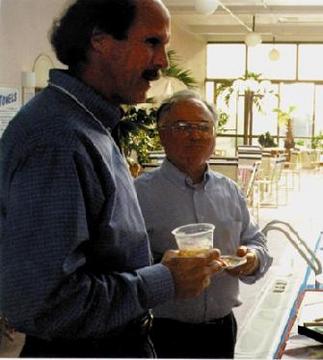UniForum '98 Report
I am writing this article as I fly back from the UniForum Association Spring '98 Conference. This was only the second East Coast conference held by UniForum in its 17-year history. It was held in Ocean City, Maryland—a beautiful town by the Atlantic Ocean.
UniForum is an advocacy organization that promotes the use of Open Computing solutions—or, to put it in succinct terms, the use of UNIX and UNIX-like solutions. UniForum and Usenix have tended to complement each other with UniForum being the conference for suits and Usenix the conference for T-shirts.
The conference was a two and a half day event that looked light on paper. Once there, I discovered there was too much to do in such a short time. For the first two days, there were three tracks: New Open Software Development Model and Linux, Network Computing and Best of SCO Forum. All tracks included common Plenary and Keynote sessions. On the third day there were two three-hour sessions: one presented by the Open Group and the other by Linux International. I attended all the Linux track sessions as well as the common sessions.
Monday's Plenary session was Eric Raymond's presentation of his paper The Cathedral and the Bazaar which is credited with convincing Netscape to take their Open Source stance.
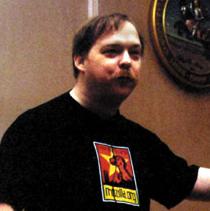
Eric Raymond
If you haven't heard the talk or read the paper, it is available on our Linux Resources page.
After Jon Hall introduced the Linux track, Frank Hecker, who is a systems engineer at Netscape, gave a talk entitled The Why and the How that filled in the background of Netscape's decision to embrace the Open Source model. For those of us who have been involved in what I call “revolution from below”--that is, attempting to sell Linux or Open Source to those in the trenches and let it move up the corporate ladder—Frank had some interesting things to say. He said the engineers didn't believe Open Source could happen with Netscape. So, Frank went to Marc Andreessen with the idea, and the rest is history.
After Frank's talk, we got together for the keynote lunch where Ralph Nader spoke on the Microsoft monopoly and how Linux could be a big player in an alternate solution.
It was a treat to get to meet Ralph and to hear the word Linux come out of his mouth just a few days after hearing Marc Andreessen say it. I brought up how U.S. government procurements used to require a POSIX-compliant operating system be made available with any system they purchased, and Ralph and his staffers are going to look into why that requirement was dropped. I asked him to keep LJ up to date on any findings, but you might also wish to check out his web site at https://www.essential.org/.
Two afternoon sessions were held in the Linux track. The first was presented by Ron Workman of Cygnus Solutions, and the second was presented by me. Covering mine is easy—I went through a series of articles which have appeared in our Linux Means Business column, illustrating how companies identified a problem, then used Linux to address that problem.
Ron's talk addressed Open Source software from a different direction: how a company can succeed in the business of supporting freely available software. Cygnus was founded in 1989 to provide commercial support for open Internet technologies and has grown to 160 employees. The company has succeeded by offering consulting and support on such products as the Free Software Foundation's GNU C Compiler.
Monday evening was filled with good food and bad beer (Coors Light?—lucky Linus wasn't there) at a beach party hosted by Red Hat Software. Like most parties at these conferences, the evening was filled with meeting others and talking about computers, the UNIX market and telling Microsoft jokes. I found it a valuable time to get to know people better, for example, Morgan Von Essen and Garry Paxinos of Metro Link, and to thank Alan Fedder and Kathy Goetz of UniForum for organizing the conference.
Tuesday morning started with a Plenary by Eid Eid, President of Corel Computer (see LJ, Issue 48). If I had to choose one person who provided me with the most new information, I would choose Eid. I did cheat a little however, as I also talked to him extensively over lunch.
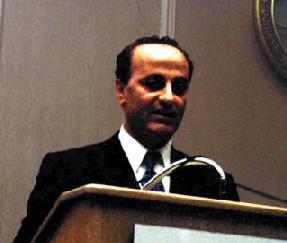
Eid Eid
Eid's Plenary was a pleasant combination of future fantasy and a look at what is available today. The fantasy part consisted of describing a day in the life of Mr. Twenty O'One, illustrating what we should expect in the near future (2001 isn't that far away) from our personal communicator: voice- and e-mail access, voice commands and an interface to the Corel NetWinder.
At the office, Mr. Twenty O'One will have a typical Intel-based PC but most of his work will be done on his personal communicator and his NetWinder. The NetWinder is much faster for doing common tasks because, while it is a complete Linux system, common tasks (everything from e-mail to video conferencing and replying to e-mail with a voice message automatically appended to e-mail) are trivial to access.
After this fictional introduction, Eid went on to cover the pieces which actually exist today, including the NetWinder, video conferencing, XML and capable portable systems. He went on to say that we need to make all the interfaces and standards open so any vendor can produce pieces which interoperate. I expect some people were surprised when he said, “Corel, Lotus and others will have no choice but to provide some source code for commercial products in the near future.”
Eid also pointed out that Microsoft controls over 50% of the money made on PC applications. Eid was the Chief Technical Officer for Corel Corporation, makers of CorelDraw and owner of Corel Computer before becoming President of Corel Computer. He explained how Corel had been a Microsoft partner until Corel acquired WordPerfect, then Microsoft started hiding technology from them.
As many of us have concluded in the past, Eid believes you cannot successfully fight Microsoft, but went on to point out what you can do. He sees the network computer as the new wave, being less costly and more maintainable. The network computer opens up a new market and, done right, it can become a market as large as today's personal computer market.
The morning session in the Linux Track included a presentation by Don Rosenberg of Stromian Technologies on making money with Open Source as an OEM/VAR. Differing from Ron Workman's presentation of the previous day, Don's presentation was a mini-tutorial on how to get into a market and how to make the right distribution choices along the way.
Next, Morgan Von Essen, President of Metro Link, with the help of Garry Paxinos, Vice President, presented a talk on Metro Link's cooperative work with the XFree86 community—another model of a commercial enterprise working with the free software community. In this case, they developed technology needed for their commercial customers and then gave that technology back to the XFree86 community. Doing this makes it easier for Metro Link to continue development, because their work becomes standard in new XFree86 releases.
Tuesday's keynote lunch was presented by Janpieter Scheerder who was President of Sunsoft and has now moved to head the storage division of Sun. He talked about WebTone and made some very interesting points demonstrating how the non-Microsoft community is growing faster than the Microsoft community. His pointed out that while MS Windows sales are growing at 13% a year, companies like Cisco are growing at 30%, and that while there are over 100,000,000 MS/PC users, that number is a small minority of the six billion people on the planet. He also pointed out that every Quicken user who registers their product is a UNIX user since the Quicken on-line registration server runs on Sun systems.
Janpieter explained that today most ISVs will port their product to either NT or Solaris. By mentioning an old Dutch saying, “the enemy of my enemy is my friend,” he clearly sees Linux as an ally. By the same reasoning, we need to see Sun ports as potential Linux ports of the future.
Janpieter, like Eid, pointed out that the network computer is in—all we need is a $150 device to connect to the Internet. He then went on to talk about two subjects: first “OPEN-standardization” and then Java. This got a reaction from both Eric Raymond and Eid Eid, who both pointed out that for Java to be the answer, its standard needs to be open. There was no resolution, but I am sure we were heard.
The afternoon Linux track brought Bob Young, discussing the size of the Linux market or, more accurately, explaining how hard it is to come up with an accurate estimate. Bob also announced the availability of the Extreme Linux CD which includes all the Beowulf RPMs for those of you who want to build your own supercomputer. Jon Hall of Linux International closed the track with some general comments and preparation work for the workshop the following morning.
On Wednesday the Linux track attendees changed their plans and attended the first hour of a presentation entitled What Exciting Technology is Emerging? by The Open Group, the organization that owns the UNIX brand and standards. In this presentation, the Open Group announced the UNIX'98 standard.
Historically, vendors such as Digital, Hewlett-Packard and Sun have paid a lot of money to use the UNIX brand. This money goes to support The Open Group's work on the standards and enforcement of the trademark. While it would be great for Linux or a Linux distribution to be UNIX branded, the cost is prohibitive.
The Open Group has now recognized the advantage of getting the Linux community on board. While Sun and others anchor the high end of the Open Systems community, having an entry-level system compatible with the standard would be a plus. This is not yet a done deal. While the use of the UNIX trademark is limited to those who have paid the fees, the opportunity will be present for a system to be conformant with the standard. Stay tuned, this could be the in necessary to tighten the bond between Linux and the rest of the UNIX community.
For more information on the UNIX'98 standard, see the web page https://www.UNIX-systems.org/. Version 2 in HTML can be browsed or downloaded at https://www.UNIX-systems.org/go/unix/.
The melding of minds with regard to UNIX standards, Open Computing and Open Source software needs a venue and UniForum has elected to be that venue. Here's what Alan Fedder, President of UniForum had to say about it:
UniForum Association is the only forum for open discussion and open debate about open computing. Where else could Eric Raymond and Mike Lambert [of The Open Group] debate each other, listen to each other, and have a better understanding of each other's position? Where else could you hear Ralph Nader, Eid Eid, Janpieter Scheerer, Eric Raymond—all quoting Eric Raymond? Momentous things happened at the UniForum Spring Conference in Ocean City—and I honestly believe that five years from now, 5,000 people will be telling each other they were there when UNIX was saved.
In conclusion, I found attending the conference to be truly worthwhile and look forward to going again next year.
Phil Hughes is the publisher of Linux Journal. He can be reached via e-mail at phil@ssc.com.


